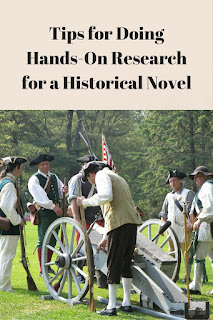Reading non-fiction books is a great way to research different time periods, careers or industries. However, nothing beats talking to an expert in order to really get the details of a specific industry or occupation correct. There are a wealth of people for contemporary writers to turn to in order to learn. Who should a historical novelist speak with in an effort to better understand or accurately portray their chosen time period?
 Interpretive guides at historical sights are a great resource for historical writers. Interpretive guides are well versed in their time periods and historical facts, and they love to share what they know.
Interpretive guides at historical sights are a great resource for historical writers. Interpretive guides are well versed in their time periods and historical facts, and they love to share what they know.I had the chance to speak with two very well informed guides at Yorktown when I was there a few years ago. We discussed 18th century medicine and surgical techniques. At the time, I was writing a scene about removing a musket ball from a man's arm. One advantage to speaking with someone about the procedure instead of just reading about it was the ability to ask questions. At the Yorktown surgical tent, different medicine in small jars as well as an array of surgical tools were available to touch. One guide clutched a musket ball in his fist and then had me "extract" the ball using ball forceps. Sounds easy, right? It's not, and I ended up pinching the poor man's hand. The lesson drove home the importance of the patient being awake during the operation to help guide the surgeon, and how a surgeon needed speed to perform the operation with minimal damage. I also learned that vinegar was used as an antiseptic and that the wound probably wouldn't have been sutured. These were important details.

 The next time you need information on a particular aspect of your chosen time period, think about the different museums or groups in your area that you might be able to speak with. Near where I live, there is The San Diego Maritime Museum which has the 19th century ship The Star of India and the HMS Surprise from Master and Commander: The Far Side of the World with Russell Crowe. I've visited both ships and spoken with the interpretive guides numerous times while doing research for my various books, a list of which can be found here. If you don't live near a historic museum then go on-line. Many historic sights have emails or phone numbers that you can use to contact the experts. Also, the next time you're on vacation, try and take advantage of the historic sites you might be travelling near. Even if you don't use what you learn in your current work, file it away for the future. You never know when some fact from an interpretive guide might come in handy.
The next time you need information on a particular aspect of your chosen time period, think about the different museums or groups in your area that you might be able to speak with. Near where I live, there is The San Diego Maritime Museum which has the 19th century ship The Star of India and the HMS Surprise from Master and Commander: The Far Side of the World with Russell Crowe. I've visited both ships and spoken with the interpretive guides numerous times while doing research for my various books, a list of which can be found here. If you don't live near a historic museum then go on-line. Many historic sights have emails or phone numbers that you can use to contact the experts. Also, the next time you're on vacation, try and take advantage of the historic sites you might be travelling near. Even if you don't use what you learn in your current work, file it away for the future. You never know when some fact from an interpretive guide might come in handy.If you enjoyed this post then you will love the history in my books because there is a lot of it.



5 comments:
I love going to places where there are reenactments. We used to live close to two such sites in NY. Recently went to Gettysburgh on a reenactment day. You're correct. It's wonderful to be able to ask questions!
I think the guides appreciate it too. I'm sure they have a lot of days when school children come through with glassy eyes and no interest in history. They must love days when people pick their brains and show a genuine interest in their knowledge.
Also speak to hobby reenactors, for battles, etc. I spoke to one who verified a wall of muskets can drown out cannon fire.
You give some really hands-on tips to historical research. We heard some of this today at the Highlights Foundation workshops. Thanks for your timely post at the #LMMLinkup this week. Posts that encourage writers to hone their craft with excellent tips are really helpful. Thank you again. :)
I love how historical visits make history come alive for our children. We went on a field trip to Mount Vernon this spring and it was AMAZING! Thanks for sharing at the #LMMLinkup.
Post a Comment